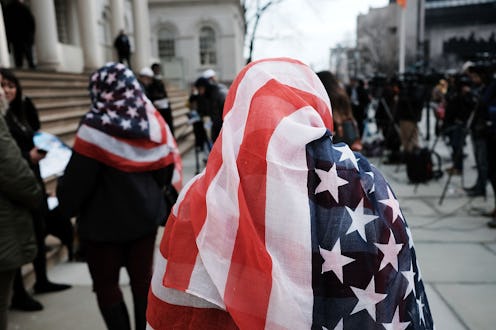
A young Muslim teen's text with her father has gone viral online. According to BuzzFeed, 17-year-old Lamyaa from Pennsylvania found herself in an altercation about Donald Trump in a group chat. According to Lamyaa, her status as a Muslim woman elicited a negative response from a fellow chat member, who claimed that "[her] dad would beat" her if she removed her headscarf. In order to prove the person wrong, the Muslim teen texted her dad about her hijab, which led to all kinds of responses online. From support to criticism, Lamyaa's tweet sparked a debate about the hijab.
Lamyaa shared a screenshot of the person who allegedly told her to take her hijab off. She shared it along with a screenshot of her speaking with her father who lives in Saudi Arabia. She told her father that she wanted to tell him something and he responded in Arabic, "My love, are you OK?" Lamyaa told her father that she was considering taking her hijab off — occasionally called "dejab" by some Muslims — and her father proceeded to tell her that it was her prerogative to do so, writing, "Sweetheart that's not my decision to make. That's no man's decision to make."
The hijab is a controversial subject for many and it is best understood in nuance. Before one can get into understanding why a Muslim woman would choose to wear such a headscarf, it's good to remember that there are different types of headscarves and coverings in Islam; the hijab is only one of them. Furthermore, there are different schools of thought in Islam when it comes to the subject of hijab. Some Muslims observe it strongly, while others have a more relaxed relationship with it. Ultimately, it should come down to whether a woman wishes to wear it or not.
Lamyaa's tweet received tons of support from users on Twitter. BuzzFeed reported that she wanted to dispel the stereotype that Muslim men are controlling and orthodox individuals who "oppress" Muslim women.
Others had reservations about Lamyaa's post. Some believed that her tweet overlooked the fact that some Muslim women are indeed forced to wear the hijab and other forms of religious covering.
One user alleged that Lamyaa failed to see how others could be oppressed by being forced to wear the hijab. The tweet said, "Countless of girls (like myself) ... want to take it off, but can't and face the literal threat of violence from parents."
Lamyaa said that her intention was not to offend or hurt anyone. "A lot of people mistook [my] tweet as me saying no women are forced to wear the hijab. I just wanted to say that that was not the point of the tweet. ... I personally chose to wear the hijab, for myself and for God. I do not speak for other women," she said in a follow-up tweet.
Lamyaa showed support to those who feel that they do not have a direct say in whether they should wear the hijab or not. She explained, "I will always stand up for others and it breaks my heart to know that some women do not get to make a choice in [it]."
If anything, Lamyaa's tweet is refreshing in terms of showing an underreported side of Islam, specifically how Muslim fathers and daughters bond with each other. It also shows how many Muslim women choose to wear the hijab, and that their decision to do so should be respected.
At the end of the day, the hijab is a woman's prerogative. That is because Islamic law does not necessarily require mandatory wearing of the hijab. The Quran — which is Islam's primary religious text — does not exactly say that the hijab is compulsory. It becomes a matter of interpretation and implementation — and that differs across different countries, cultures, and sects.